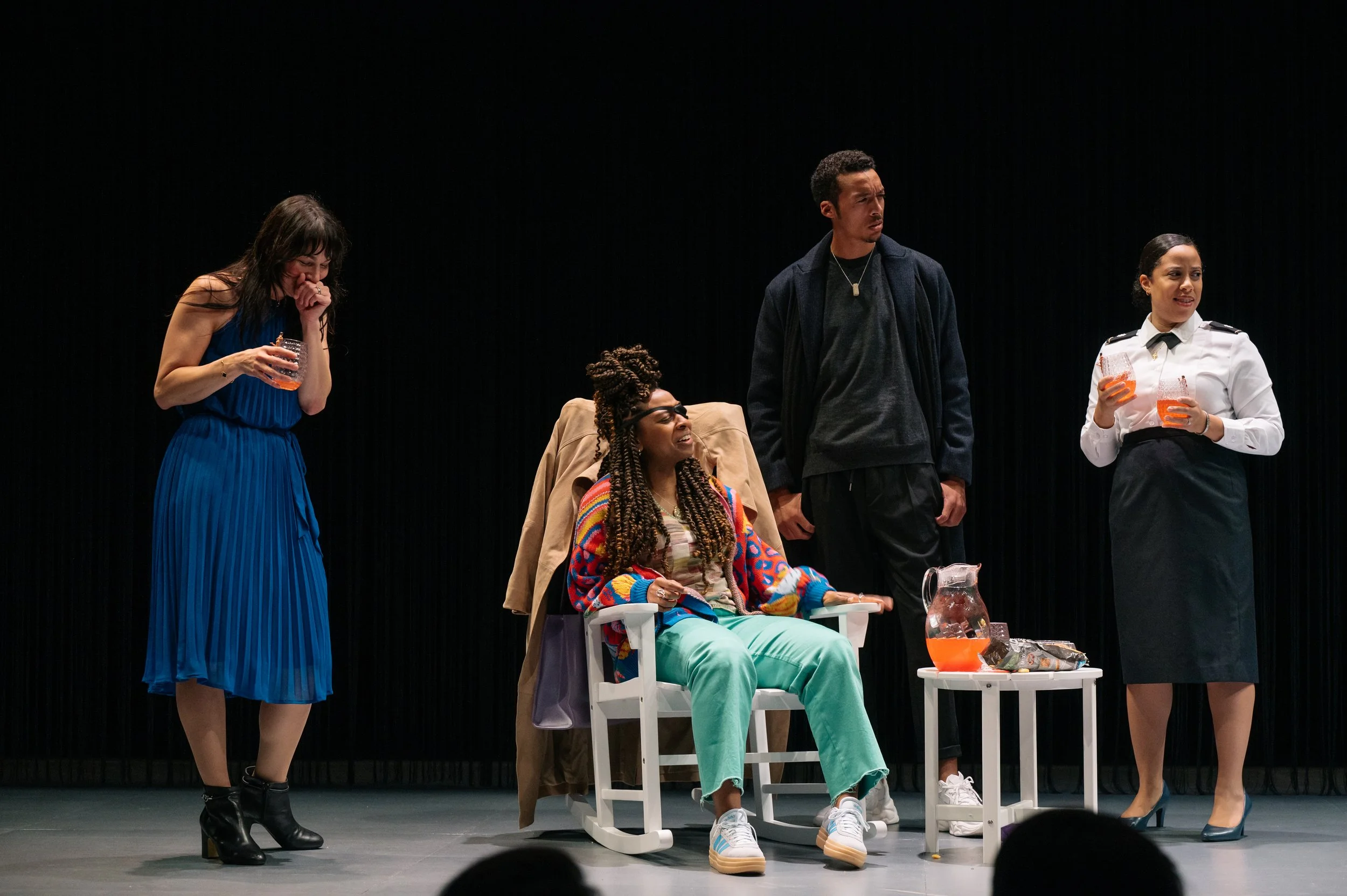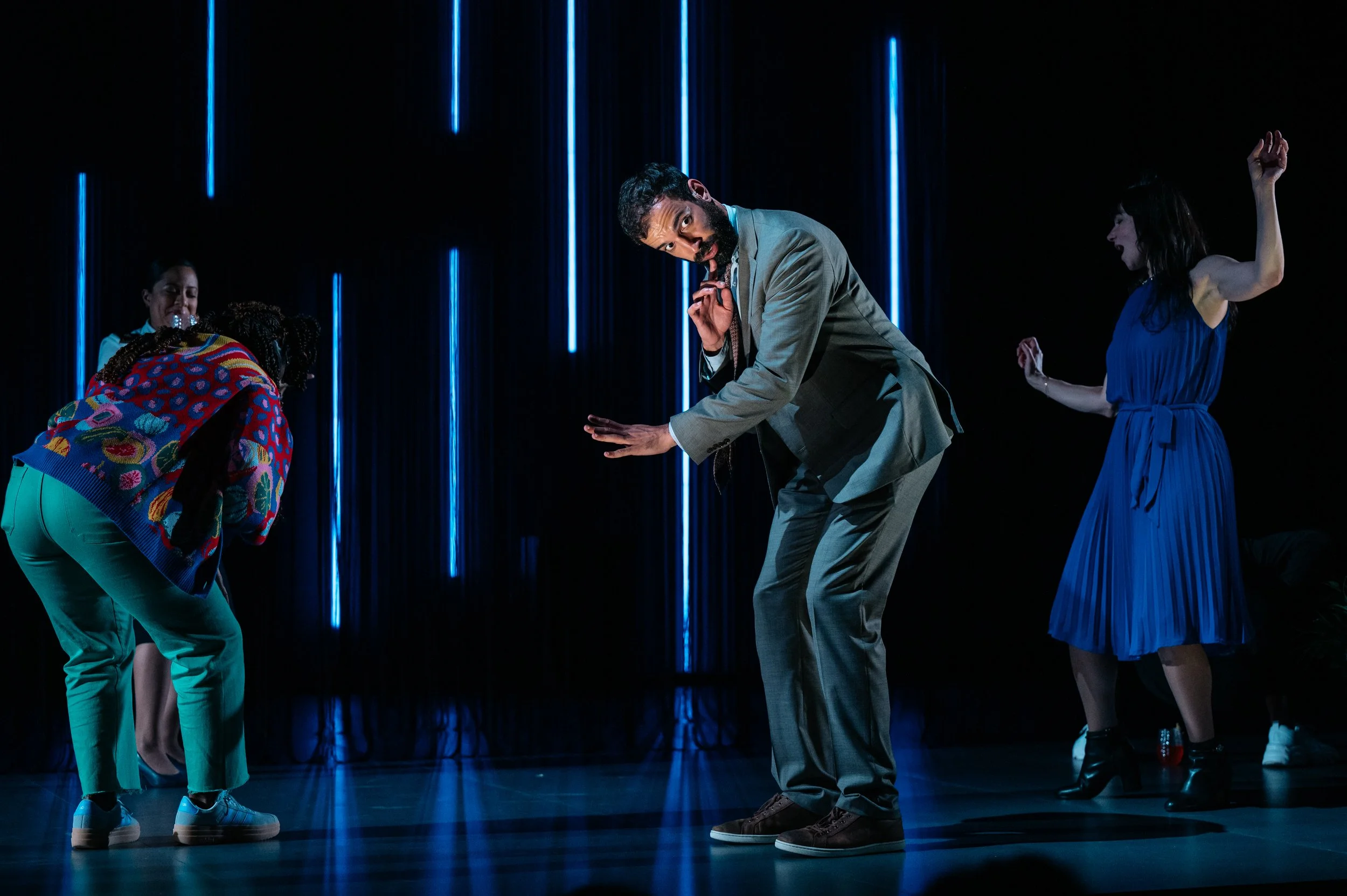Mortality, Chaos, and Aging Millennials: ‘Comeuppance’ at Woolly Mammoth
Sarah Gliko, Alana Raquel Bowers, Jordan Bellow, and Taysha Marie Canales in The Comeuppance. Cameron Whitman Photography.
The Comeuppance–on stage now at Woolly Mammoth Theatre–is a dark comedy with a simple premise that slowly builds tension, layers, and unexpected nuances. It is anything but simple, and the production kept surprising from beginning to end. Alternatingly funny, shocking, and heartbreaking, the play centers on a group of high school friends reuniting twenty years after graduation. The acting is sharp, the dialogue witty, and the production moves easily from comedy to tragedy, empathy to cruelty, love to hatred. It’s a beautiful and moving production. But prepare to be unsettled. If you enjoy going out to a show that makes you think, question, and feel intensely, this is the show for you.
This production, directed by Morgan Green and presented in collaboration with Philadelphia’s Wilma Theater, runs through October 6th. (The production will continue at The Wilma in November and December 2024.) Written by MacArthur Genius Award winner Branden Jacobs-Jenkins, it premiered Off-Broadway in 2023 to critical acclaim and subsequently played in London, but the story is set in Prince George’s County, Maryland.
In fact, the local connection is no accident. The playwright grew up in D.C., though he now lives in Brooklyn. Jacobs-Jenkins is not yet 40 but already has an impressive body of work, including seven previous plays. His plays Gloria and Everybody were finalists for the Pulitzer in 2016 and 2018, respectively. His new work is very much of the present moment and it explores the reality of adulthood and aging for the playwright’s Millennial generation. It’s also set in 2022, featuring characters (and a world) reemerging from the Covid pandemic.
Alana Raquel Bowers in The Comeuppance. Cameron Whitman Photography.
The Comeuppance has a simple premise. Emilio (Jordan Bellow), Ursula (Alana Raquel Bowers), Kristina (Taysha Marie Canales), Katelyn (Sarah Gliko), and Paco (Jaime Maseda) are old friends (class of 2002) attending their 20th high school reunion. But instead of meeting at the reunion, the friends have gathered on Ursula’s front porch – a pre-party. The group feels like a dysfunctional family coming back together after years apart. Their gathering starts off friendly, but quickly devolves into old grievances and long-standing resentments, transforming the tone of the play from relaxed to intense and chaotic.
The play isn’t just an updated version of stories like the 1980s classic film The Big Chill. There’s an uninvited, otherworldly guest at this party: Death. Hidden from the characters but revealed to the audience almost immediately, Death pauses the action frequently and speaks directly to the audience, breaking the fourth wall. As Death speaks through each character at different intervals, the stakes of the high school reunion are raised. This isn’t just a story about flawed relationships and wacky hijinks: it’s a story about the ravages of time and the inevitability of loss, grief, and regret.
The scenic designer, Jian Jung, uses bare-bones staging to imply that the setting is a porch. A chair. A potted plant. No backdrop showing a house, just the suggestion of a house behind a long black curtain. The staging does feel a bit bland, but it is notable, as the story. focuses so much on death and transformation, that the characters are gathering not inside the house, or in their old school, but in this in-between space. A way station.
Interestingly, the curtain is not really a curtain. There appear to be layers of black strings so that characters can pass through a filmy barrier from the porch into the house and back to our scene outside. This creates an otherworldly feeling, heightening the story's supernatural aspect. The effect is particularly striking in moments of high tension when colored lights flash behind the barrier. Much credit is due Minjoo Kim for her lighting design, as well as Jordan McKree, whose sound design adds interesting punctuation and ambiance.
The Comeuppance is a true ensemble piece, and Bellow, Bowers, Canales, Gliko, and Maseda are a powerful ensemble. Not only do they convincingly play friends who have known each other for decades, they also portray Death with impressive consistency, so it really does feel like one entity speaking through all five actors. In the hands of lesser actors, this device could become campy, but here it is powerful and enchanting, allowing the actors to demonstrate their range. The cast has no weak links, but Jordan Bellow and Sarah Gliko particularly impress me. They deliver stand-out performances as Emilio and Katelyn, respectively.
Alana Raquel Bowers, Taysha Marie Canales, Jaime Maseda, and Sarah Gliko in The Comeuppance. Cameron Whitman Photography.
While our friend group drinks, dances, and tries to reconnect, they discuss a lot of heavy subject matter. Even without Death as a character, it would be evident that death has been part of their lives for a long time. This generation came of age with Columbine and 9-11. Guns and war have defined their adulthood, and now, along with the rest of the world, they’ve just lived through the Covid pandemic. Abortion, rape, PTSD, racism, January 6, and other social issues are also discussed. And yet, The Comeuppance doesn’t feel like an “issue” play. None of these serious topics feel forced into the dialogue.
Rather, Jacobs-Jenkins weaves heavy subject matter into the play naturally and seamlessly, and the effect is that decades of history and collective trauma spill out of the characters as they talk. Emilio and his friends may have gathered for a celebration, but they seem incapable of enjoying it. Instead, they focus on the traumas they’ve lived through, both individually and collectively. It’s a stark reminder that we live in a chaotic world, that violence, loss, and change are our constant companions.
And yet this is not a cynical play. Over and over, throughout the night, even as characters clash and show their worst sides, we see moments of connection. We see love, kindness, and decency. We see a chance for redemption in even the most unlikeable character.
The Comeuppance asks the audience to consider our capacity for empathy, caretaking, and collective action, even when reminded of our capacity for violence and indifference. Branden Jacobs-Jenkins offers a lot of scathing social and political commentary in his latest play. But he also offers hope. This play seems to suggest that we can make the world better if we try to connect, if we do our best to take care of each other, if we don’t give up on our fellow humans or ourselves.
Running time: 2 hours 20 minutes with no intermission.
The Comeuppance runs through October 6 at Woolly Mammoth Theatre Company—641 D St NW, Washington, DC 20004. For tickets, call the box office at 202-393-3939 or purchase them online.
Norah Vawter is the Local Authors Editor for DCTRENDING. She’s a freelance writer, editor, and novelist, represented by Victress Literary. Norah lives in Virginia with her family. Follow her @norahvawter on Instagram and Twitter, where she shares words & works of D.C. area writers every Friday.



